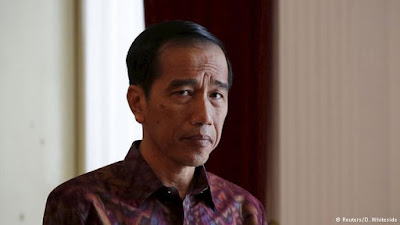Indonesia now has 3 Islamic militants on death row after the South Jakarta District Court sentenced Jamaah Ansharut Daulah (JAD) leader Aman Abdurrahman to die before a firing squad for directing a 2016 gun and bomb attack in downtown Jakarta from behind bars in a supposed maximum-security prison.
Aman, 46, joins Iwan Darmawan Munto and Ahmad Hasan, who received the death penalty 13 years ago for their role in the September 2004 car bombing of the Australian Embassy which left 10 people dead, including the suicide bomber.
The only Indonesian terrorists to be executed so far have been Jemaah Islamiyah (JI) militants Imam Samudra, Amrozi bin Nurhasyim and Ali Ghufron, all accused of killing 202 people in the 2002 Bali nightclub blasts, the world's worst terrorist attack since the September 11, 2001 carnage in the US.
In an alarming demonstration of weaknesses in the Indonesian penal system, Aman and Munto allegedly arranged for the funding and procurement of the weapons used in the 2016 attack from the prison island of Nusa Kambangan off Java's south coast. 8 people died, including a Canadian and the 4 assailants.
Group 'loyal' to ISIS
Aman, whose group pledges loyalty to the Islamic State of Iraq and Syria (ISIS), was also accused of instigating a November 2016 attack on a church in East Kalimantan that killed a 2-year-old girl and injured 4 other children, and the May 2017 bombing of a Jakarta bus terminal, where 3 policemen died.
Educated at Jakarta's Saudi-funded Islamic and Arab College of Indonesia, the former preacher has a long history of militancy dating back to 2004, when he was given a 7-year jail term for his involvement in an unexplained bomb blast in a rented house in the southern Jakarta suburb of Depok.
Released for good behavior in 2008, he joined JI spiritual leader Abu Bakar Ba'asyir in establishing a terrorist training camp in the jungles of Aceh, in northern Sumatra, that sought to unite militant groups in the wake of a concerted government crackdown.
Arrested again in 2010, he was sentenced to a further nine years in Nusa Kambangan, from where he and Munto used smuggled mobile phones and frequent, apparently unsupervised visits, from dedicated followers to plan the series of subsequent attacks.
It is doubtful whether Aman or the other 2 death-row prisoners will be executed anytime soon now that President Joko Widodo appears to have had 2nd thoughts about capital punishment.
While Indonesia remains under constant threat from terrorism, evidenced by the May bombing of 3 Surabaya churches and other violent acts in Jakarta and Sumatra, activists have been quick to condemn the death penalty given to Aman.
Unrepentant militant
Most argued that it would not act as a deterrent and instead could set up the unrepentant militant leader as a martyr, even if it is clear that only hardline elements see the 3 Bali bombers in that light given the enormity of the death toll they caused.
"Policymakers must not be driven by the strong reactions that understandably emerge in the aftermath of such horrendous violent attacks," said Amnesty International Indonesia's executive director Usman Hamid. "They must take all steps in their power to consign the death penalty to history."
Certainly, there is nothing to suggest terrorists are treated any differently from other prisoners, even if Australia's reaction to the deaths of the Bali bombers was muted compared to the execution of heroin traffickers Andrew Chan and Myuran Sukumaran in April 2015.
When the 2 Australians and 6 other foreign drug convicts died by firing squad on Nusa Kambangan on the same night, it set off a diplomatic storm with Indonesia's southern neighbor, which carried out its last execution in early 1967.
Chan, Sukumaran and the rest of the so-called Bali 9 ring were arrested at the resort island's airport and at a nearby hotel in April 2005 with 8.3 kilograms of transshipped Golden Triangle heroin they intended to smuggle into Australia.
While the other 7 defendants ultimately received 20 years to life in prison, including one who died this month of cancer, the courts never considered the fact that the 2 ringleaders only intended distributing the heroin in Australia as grounds for clemency.
The Australian Federal Police (AFP) came under fire for its handling of the case and its belief that none of the suspects would face the death penalty - even though 3 drug dealers had been executed the previous year on president Megawati Sukarnoputri's watch.
Successor Susilo Bambang Yudhoyono allowed 15 executions over the next 4 years, including those of the Bali militants. Then followed a 4-year moratorium before a Nigerian, a Vietnamese and a Pakistani paid the ultimate price for the same offense, along with 3 convicted killers.
No executions since 2016
In 2014, there were none again. But expectations that Widodo would continue that policy ignored the fact that his modest upbringing in the Javanese heartland had not exposed him to the global moral debate over the death sentence.
All the same, the furor over the shooting of the Australians and 12 other inmates in 2015 clearly gave him pause and while 6 other drug offenders were put to death in July 2016, the executions of 10 others were deferred and there have been none since.
Indonesian courts continue to administer capital punishment, however, with 25 criminals, most of them drug dealers, sentenced to die so far this year and another 47 last year. As of today, according to Amnesty International, there are 288 death row inmates in Indonesian jails.
Source: Asia Times, John Mcbeth, June 27, 2018
⚑ | Report an error, an omission, a typo; suggest a story or a new angle to an existing story; submit a piece, a comment; recommend a resource; contact the webmaster, contact us:
deathpenaltynews@gmail.com.
Opposed to Capital Punishment? Help us keep this blog up and running! DONATE!
"One is absolutely sickened, not by the crimes that the wicked have committed,
but by the punishments that the good have inflicted." -- Oscar Wilde













